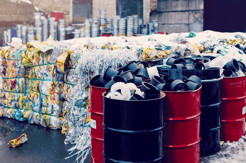No, the title is not a stutter; I’ve written it that way to emphasize that the new Environmental Protection Agency (EPA) proposal to revise its Accidental Release Prevention (ARP) program rules under the Clean Air Act (CAA) represents only the latest step in nearly-decade-long changes to these requirements across the last three Presidential administrations. ARP was enacted after the 1990 Clean Air Act (CAA) Amendments, and its often known by its core requirement that targeted facilities prepare Risk Management Programs (RMPs) to prevent and respond to potential catastrophic releases of chemicals.
Read MoreAudit, Compliance and Risk Blog
EPA proposes Re-Re-Revisions to Accidental Release Prevention Rules
Posted by Jon Elliott on Mon, Sep 12, 2022
Tags: EPA, chemical safety, Environment, Toxics Release
Canadian securities administrators propose climate-related disclosure requirements for public companies
Posted by Jon Elliott on Mon, Aug 22, 2022
When must organizations evaluate and disclose how climate change will affect their operations?
The Canadian Securities Administrators (CSA) provides a cooperative forum for Canada’s provincial and territorial securities regulators, including the development of model regulations and associated guidance. Last October, CSA took its latest step toward climate-related disclosure requirements, by proposing “National Instrument 51-107 – Disclosure of Climate-related Matters;” public comments were due by January 17, 2022. Assuming CSA moves ahead and finalizes this National instrument (NI), then securities regulators throughout Canada will enact equivalent requirements and establish compliance deadlines for companies they regulate.
Read More
Tags: climate change, Environment, Canada, Climate
California phasing out non-recyclable single-use plastics
Posted by Jon Elliott on Mon, Aug 08, 2022
On June 30, 2022, California governor Gavin Newsom signed state Senate Bill (SB) 54, enacting the “Plastic Pollution Prevention and Packaging Producer Responsibility Act.” The Act phases in a ban on non-recyclable single-use plastics by 2032, and requires that threshold proportions of single-use items sold as “recyclable” will actually be recycled. Its implementation will make use of “extended producer responsibility” mechanism similar to those used in California and elsewhere for other enhanced recycling programs (I’ve written about these before, most recently HERE and HERE). The new Act will be overseen by the California Department of Resources Recycling and Recovery (CalRecycle). The new Act complements a variety of other state programs, many also overseen by CalRecycle. The remainder of this note discusses SB 54’s provisions.
Read MoreTags: California, Environment, plastics, microplastics
Department of Justice Reviving Use of Supplemental Environmental Project Agreements
Posted by Jon Elliott on Mon, Jun 13, 2022
On May 12, 2022, the US Department of Justice (DOJ) published an interim final rule that revokes a Trump-era prohibition against its attorneys’ use of payments to third parties, including via “supplemental environmental projects (SEPs)”, in settlements with violators of federal environmental laws. (I discussed Trump Administration policies several times, most recently HERE). In these cases, DOJ acts as the attorney for the agencies, such as the Environmental Protection Agency (EPA), that enforce laws and regulations allegedly violated. This rule change would codify policy changes presented in a memorandum from Attorney General Merrick Garland to US attorneys. This change is designed to restore flexibility to DOJ’s US attorneys to trade penalty dollars for more rapid commitments by wrongdoers to undertake actions to offset harms caused by their violations.
Read MoreTags: EPA, DOJ, SEP, Environment, Climate

On May 4, 2022, the US Environmental Protection Agency (EPA) published notice of a proposed consent decree in litigation brought by the environmental group Center for Biological Diversity (CBD). EPA proposes to issue a decision responding to a petition filed by CBD in 2014, about whether to list discarded polyvinyl chloride (PVC) as hazardous waste under the Resource Conservation and Recovery Act (RCRA). CBD filed the suit early in 2021, after EPA had taken no action on its petition for seven years, claiming that the agency’s inaction violated a duty to act. EPA is now ready to commit to issue a proposed decision no later than January 20, 2023, and a final decision by April 12, 2024.
Read More
Tags: EPA, Environment, plastics, PVC
Biden Administration reverses Trump Administration revisions to Federal Environmental Impact Assessment rules
Posted by Jon Elliott on Mon, May 09, 2022
The federal Council on Environmental Quality (CEQ) has revised its regulations administering the National Environmental Policy Act (NEPA) of 1969. NEPA requires federal agencies to assess the environmental effects of their proposed actions, and incorporate this information into their decisions. Government-wide guidance is provided by the White House’s CEQ, established by NEPA and appointed by the President. CEQ issues formal regulations that agencies must follow, and guidance documents that provide additional advice. CEQ also reviews agencies’ NEPA implementation programs, and publishes annual national Environmental Quality Reports.
Read MoreTags: Environment, Climate, NEPA, CEQ
The Environmental Protection Agency (EPA) has proposed to ban a number of longstanding uses of chrysotile asbestos, using expanded authority provided as part of amendments adopted to the Toxic Substances Control Act (TSCA) in 2016. This proposal is EPA’s latest step to apply its expanded authority to review and restrict uses of asbestos, renewing agency efforts from the 1980s that were blocked by litigation.
Read MoreTags: EPA, Environment, Climate, asbestos
EPA proposes to require worst case release planning by onshore facilities
Posted by Jon Elliott on Mon, Apr 25, 2022
On March 28, the US Environmental Protection Agency (EPA) proposed regulations requiring “non-transportation-related onshore facilities” to prepare response plans covering possible releases of hazardous substances, and submit those plans to EPA. This proposal implements longstanding but unused EPA authority under the Clean Water Act (CWA). The remainder of this note discusses the proposal.
Read More
Tags: EPA, climate change, Environment, Climate
Biden Administration again proposes to expand EPA’s budget significantly
Posted by Jon Elliott on Mon, Apr 18, 2022
On March 28, the Biden Administration issued its budget proposal for federal Fiscal Year (FY) 2023 (October 1, 2022 through September 30, 2023). The administration proposes a $11.9 billion budget for the Environmental Protection Agency (EPA), a 29% ($2.6 billion) increase above EPA’s adopted 2022 budget of $9.6 billion – similar to the administration’s FY 2022 proposal of $11.2 billion (which I wrote about HERE), which Congress cut considerably.
Read More
Tags: EPA, climate change, Environment, Climate
SEC proposes climate-related disclosure requirements for public companies
Posted by Jon Elliott on Mon, Apr 04, 2022
When must organizations evaluate and disclose how climate change will affect their operations?
The US Securities and Exchange Commission (SEC) administers reporting requirements for companies listed on national securities exchanges (“listed companies” or “public companies”), under federal securities laws including the Securities Act of 1933 and the Securities Exchange Act of 1934. Some of the SEC’s requirements provide detailed specifications, such as financial reporting consistent with Generally Accepted Accounting Practices (GAAP). Others are less quantified, requiring reporting of information that might be “material” to investors’ evaluation of a public company. Over time, SEC has added topics subject to reporting of material information, and some of these generalized requirements have evolved into more specific ones. In the latest example of this evolution, in March 2022 SEC is proposing regulatory requirements for disclosures about “climate-related risks and metrics” by public companies, enhancing and standardizing existing agency guidance (I’ve written about these several times over the years, most recently HERE). The remainder of this note summarizes SEC’s proposal.
Read MoreTags: climate change, Environment, Climate









